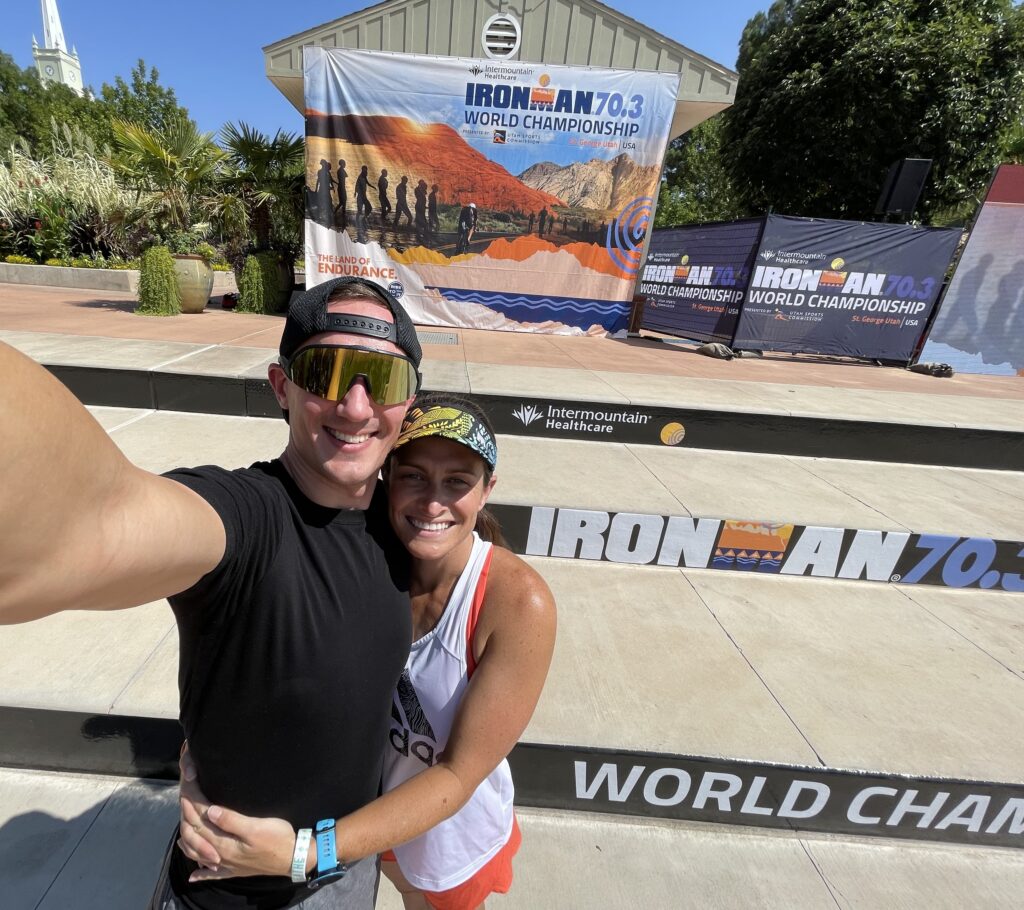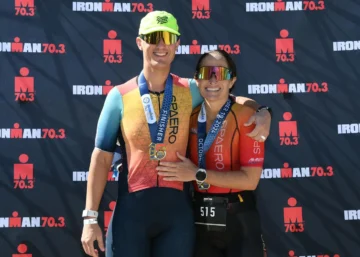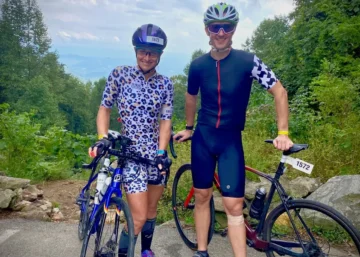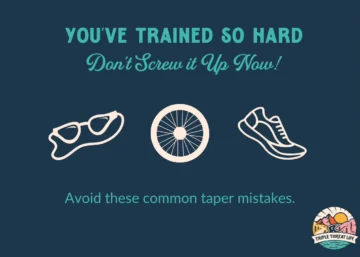
Before I was a freelance writer, I worked as the online editor of a magazine. It was a job that required a lot of travel- 10-12 weeks out of the year.
And I wasn’t sitting in meetings all day. I worked in media, so coverage would being at 8 am and typically last until 7 pm, 9 pm, or even midnight. I’d do that for two weeks at a time…
And I had that job for 13 years.
That type of intense work schedule on the road can quickly lead to exhaustion and burnout. But trying to balance triathlon training on top of that… well it can be a bit challenging.
All this to say that I know what it’s like to train for a triathlon when you’re on the road, whether it’s for an extended work trip or just a vacation.
Here are my top tips for triathlon training while traveling:

1.Set reasonable expectations– The added stress of travel, eating different food, and not sleeping in your own bed can increase your stress response. Stress is stress. Your body doesn’t recognize the difference between everyday stressors and training stress, so it’s important to set realistic expectations.
Know that your training schedule is going to look a bit different while you’re traveling, and that’s ok. You might even miss a workout. Just know that it’s not the end of the world, and you won’t lose fitness as a result.
I trained for a 70.3 while on a 3-week work trip… Less than ideal, but I made it work by doing the next step.
2.Talk to your coach– It’s important to talk to your coach ahead of time and let them know about any changes to your schedule. This might mean a reduction in training volume or intensity.
If you’re using an online training plan, you can modify things yourself. Pick 1-2 key workouts to focus on, and place those on days when you know your work schedule will be a bit lighter.
On busy work days, you can still train, but keep things easy and aerobic. Just keep your body moving.
3.Focus on one discipline– This is something we did when I was traveling a lot for work. Swimming and running are pretty easy to do on the road, but cycling is another thing.
Sometimes, I couldn’t take my bike with me. Instead of focusing on what I couldn’t do, my coach would create a run-focused training block with more emphasis on one discipline, instead of trying to fit in all three.

Swim
Swimming in hotel pools can be a challenge. Unless you stay somewhere fancy, the pool is probably going to be very small. Also, because the emphasis will be on families and kids, the pool temperature is typically not ideal for lap swimming.
But you have a few options.
A friend of mine told me about this great resource called SwimmersGuide.com. It’s an online directory for lap pools! Just type in your location and you can view a selection of pools based on size, water temperature, and amenities. You can see whether a pool has a masters swim program or drop-in policy. They even have reviews from other swimmers.
If you want to swim in a pool that’s too small for laps, you can use a swim tether. It’s basically a waistband with a stretch cord that you can attach to something stationary on the pool deck. Then, you swim in place.
Fair warning, it takes a bit of getting used to. I think it’s more tiring than regular lap swimming, because you have no propulsion. The best way to use it is to pick an interval- 2-5 minutes and just swim steady. I’d suggest using a pull buoy, because that helps provide some lift so you can focus on your stroke.
If you can’t find a pool at all, you can use a pair of dryland resistance cords. https://amzn.to/3Kf41gD

Bike
Cycling was always the most challenging thing to do when I was traveling for work. There was always a random exercise bike in the hotel gym, but they’re typically not very adjustable. Trying to do any type of real work on a bike that isn’t fit to me just wasn’t worth it.
You could try to find a spin class at a local gym, but I took a different tact and focused on strength instead. Most hotel gyms have a decent set of weights, so I would focus on lifting and bodyweight exercises to strengthen my legs and core.
It’s a pretty good replacement for cycling until you get back home and can ride your own bike.
BONUS TIP: Rinse your sweaty workout clothes in the shower and hang them up to dry by putting them on a balcony or draping them in front of the air conditioner. You can wash dirty clothes when you get home, but the longer clothes stay wet, they start to smell because of lingering bacteria.

Run
Running is the easiest thing to do when traveling, and it’s fun because you can explore different routes and enjoy new scenery. Most hotels have a treadmill, but I hate those, so I always opt for an outdoor run.
However, if you’re not familiar with the area, it can be hard to find a good, safe place to run. I’ve run in some pretty sketchy areas…
I recently learned about an amazing partnership Strava has with Westin Hotels & Resorts that provides their guests with access to unique routes at 220+ properties around the world. I spoke with Chris Heuisler, Global Run Concierge for Westin Hotels & Resorts, to find out more about the program.
Also, I wanted to know what a run concierge actually is…
“Each Westin hotel features one curated route that guests can access without signing up for a Strava trial,” Heuisler says. “Guests interested in exploring additional routes generated by Strava will be prompted to sign up for a complimentary 90-day Strava subscription trial, available to all Westin guests without commitment.”
Pretty cool! But the idea of a run concierge is even more intriguing.
You mean I could have a running partner join me on a workout? Yes! Heuisler says that’s exactly what a run concierge does.
“A run concierge provides guests with the opportunity to have a running partner, as well as learn about the area while staying fit,” he says. “Westin has over 150 run concierges around the world, encouraging guests to join a group run.”
That’s definitely something I would’ve taken advantage of when I was training for triathlon while traveling.
Apparently, Westin + Strava are hosting a challenge from now through May 31st, 2024 where any US-based Strava user and Marriott Bonvoy member who completes 600 minutes of activity will be eligible to win a Next Generation Heavenly Bed. 10 lucky winners will be selected for the giveaway.
Eating while traveling
Whether I’m traveling for work, vacation, or to a race, we always get an AirBnb or hotel with a kitchen. This is for a few reasons.
First, while it’s fun to eat out at new restaurants, I never do that prior to a race. I want to eat the same foods I eat at home, so I don’t risk any stomach upset.
If we’re on vacation, it’s a bit different. But, when I was traveling for work, I would honestly rather have an extra hour and a half of sleep than wait in line at a restaurant.
For a work trip, the first thing I’d do was stop by a grocery store or local market and buy a bunch of prepared meals. Also, I like to bring a reusable water bottle so I can stay hydrated. I bring along my favorite electrolyte mix as well as protein powder.

Sleep while traveling
Sleeping in a different bed in a room that isn’t your own can really mess with your quality of sleep. I always try to bring my pillow, because it helps create some sense of normalcy. Also, I don’t risk having a neck ache in the morning from a hotel pillow that’s too soft.
A noise machine is a MUST when traveling. I have an app on my phone that creates white noise, which can help drown out any noisy guests.
If you can, try to get up and go to bed at the same time that you do when you’re at home. With my work schedule, that wasn’t always possible, but it goes along way to helping you recover while traveling.
Keep in mind that your heart rate and rate of perceived exertion will likely be higher while traveling, so don’t worry if your workouts feel a bit harder.
Training for triathlon while traveling isn’t easy, but it can be done with proper planning. Just remember to set realistic expectations, be flexible, and stick to your normal routine as much as possible.
You might not see any huge gains training while traveling, but it will help you maintain your base fitness so you’re ready to jump back into regular training when you get home.


